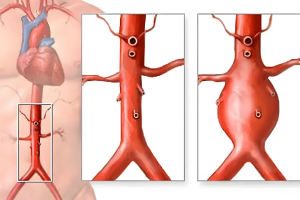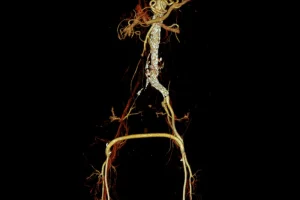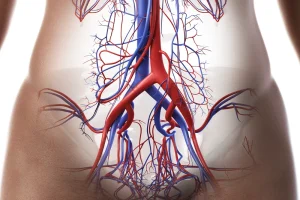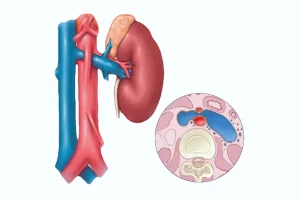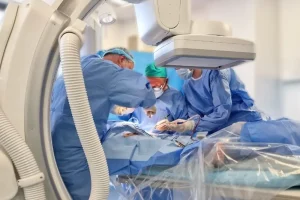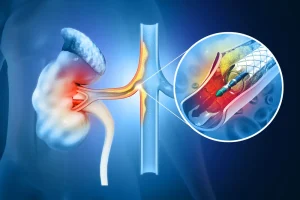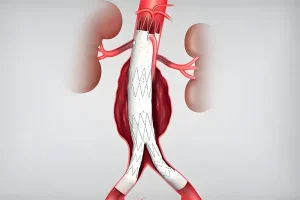Medical Procedures
Thyroid and Parathyroid
- Ultrasound-guided fine-needle Aspiration Puncture
- Total Thyroidectomy
- Thyroid Lobectomy
- Thyroidectomy + Lymphadenectomy
- Subtotal Parathyroidectomy
Neuroendocrine Tumors
- Pancreatic Neuroendocrine Tumor Removal
Adrenal

The endocrine surgery specialists at VenArt Clinic offer advanced and personalized treatments for thyroid, parathyroid, adrenal and neuroendocrine tumor disorders. Our team’s extensive experience and state-of-the-art technologies ensure safe interventions and exceptional results.
What is endocrine surgery?
Endocrine surgery is a specialized branch that deals with the diagnosis and surgical treatment of endocrine gland disorders. These glands include:
- Thyroid: responsible for regulating metabolism and vital functions;
- Parathyroid: controls calcium levels in the body;
- Adrenals: involved in stress management and hormonal balance;
- Neuroendocrine tumors: occur in organs such as the pancreas, with implications for hormonal functions.
Medical Procedures
Our team performs a full range of interventions, including minimally invasive techniques and classical approaches:
Thyroid and Parathyroid
- Ultrasound-guided fine-needle aspiration puncture: precise diagnosis by cytologic or bacteriologic examination;
- Total thyroidectomy: total removal of the thyroid;
- Thyroid lobectomy: removal of a lobe of the thyroid gland;
- Tiroidectomie + limfadenectomie: îndepărtarea tiroidei și a ganglionilor afectați în azuri de cancer tiroidian;
- Subtotal parathyroidectomy: intervention for hyperparathyroidism or parathyroid adenomas.
Neuroendocrine tumors
- Pancreatic neuroendocrine tumor removal: with or without lymphadenectomy.
Adrenal
- Unilateral adrenalectomy: removal of adrenal glands in case of tumors or severe dysfunction;
- Bilateral adrenalectomy: removal of adrenal glands in case of tumors or severe dysfunction.
Multidisciplinary Collaboration for Optimal Results
The success of surgical treatment is supported by a multidisciplinary team of collaborators consisting of:
- Super-specialized surgeons;
- Endocrinologists, radiologists and imaging physicians;
- Specialists in nuclear medicine and pathologic anatomy;
- Family doctors – for postoperative monitoring.
This close collaboration ensures:
- Accurate diagnosis and correct indication for intervention;
- Personalized pre-operative preparation;
- Tailored treatment and postoperative follow-up.
Diagnosis and Medical Consultation
At VenArt Clinic, the diagnostic process includes:
- Specialized ultrasound: Ultrasound guidance for minimally invasive procedures;
- Hormone and blood tests: Complete evaluation of endocrine gland function;
- Advanced Imaging: CT, MRI and other investigations to accurately identify problems.
Our Medical Team
Frequently Asked Questions
What is endocrine surgery?
Endocrine surgery is a branch of medicine that deals with the diagnosis and surgical treatment of disorders of the endocrine glands, such as the thyroid gland, parathyroid glands, adrenal glands or endocrine pancreas.
When is endovascular surgery recommended?
The most common conditions treated include:
- Thyroid nodules (malignant or benign);
- Hyperthyroidism;
- Parathyroid tumors (hyperparathyroidism);
- Adrenal gland tumors (pheochromocytoma, adenomas);
- Neuroendocrine pancreatic tumors.
What are the symptoms that indicate the need for surgery?
Symptoms vary depending on the condition, but may include:
- Enlarged neck or nodules on the thyroid gland;
- Weight loss or excessive weight gain;
- Palpitations, excessive sweating, anxiety (in hyperthyroidism);
- Frequent fractures or bone pain (in hyperparathyroidism);
- Severe high blood pressure (in adrenal tumors).
Consult a specialist for a correct diagnosis.
How does thyroidectomy surgery go?
Thyroidectomy is a procedure in which part or all of the thyroid gland is removed. It is performed under general anesthesia and involves a small incision in the neck. Recovery is quick and scarring is usually very discreet.
Is recovery after endocrine surgery painful?
Post-operative recovery usually involves moderate discomfort, which can be managed with painkillers prescribed by your doctor. Most patients recover completely within a few weeks.
What are the risks of endocrine surgery?
Like any surgery, there are risks such as:
- Bleeding;
- Infection;
- Laryngeal nerve damage (low risk);
- Temporary hormonal imbalances (e.g. hypocalcemia).
Your surgeon will discuss all the risks and benefits in detail before surgery.
How long does hospitalization after surgery last?
For most endocrine surgery procedures, hospitalization is 1-3 days, depending on the complexity of the case and the patient’s general condition.
Do I need hormone treatment after surgery?
Depending on the type of surgery, you may need hormone replacement therapy such as levothyroxine after thyroid gland removal. Your endocrinologist will monitor and adjust your treatment according to your needs.

